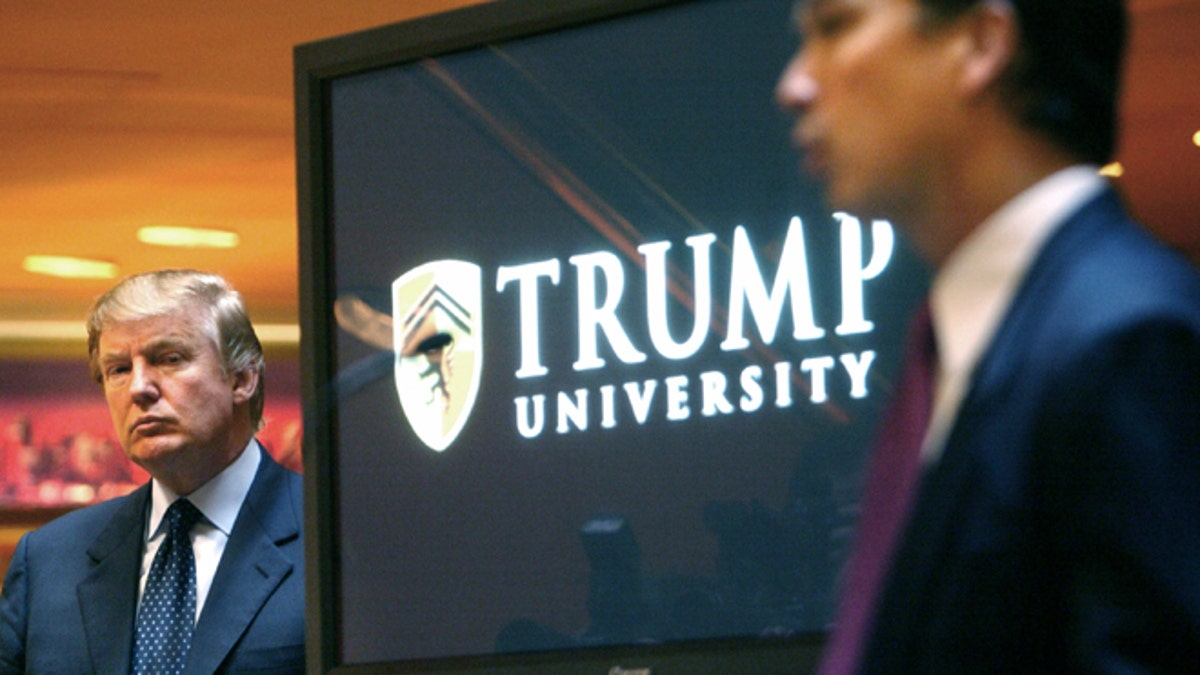
FILE- In this May 23, 2005 file photo, real estate mogul and Reality TV star Donald Trump, left, listens as Michael Sexton introduces him at a news conference in New York where he announced the establishment of Trump University. A federal judge who has been a target of Donald Trumps unending scorn must decide whether to release videos of the presumed Republican presidential nominee testifying in a lawsuit about the now-defunct Trump University, images that Trumps attorneys worry will be used to tarnish the campaign. (AP Photo/Bebeto Matthews, File) ((AP Photo/Bebeto Matthews, File))
U.S. District Judge Gonzalo Curiel, a federal judge who has been a target of Republican presidential nominee Donald Trump, refused to release video of the boisterous businessman testifying in a lawsuit about the now-defunct Trump University — a move that denies critics of the candidate a chance to use potentially powerful images against him.
Transcripts of Trump's depositions have been released over the last few months but the videos remained sealed.
Attorneys suing the business mogul have said his tone, facial expressions, gestures and body language show "complete and utter unfamiliarity" with Trump University's instructors and instruction and that he made "many spontaneous and ad hominem [personal] remarks that are not reflected in the paper transcript of his depositions."
Judge Curiel rejected the bid by various news organizations to release video of Trump's full day of testimony Dec. 10 at his New York office and three hours of testimony on Jan. 21 in a Las Vegas law office.
He also rejected a bid by Trump's attorneys to dismiss the lawsuit.
Curiel wrote that "while there is a degree of legitimate public interest in the demeanor of the defendant in the deposition videos," it did not outweigh the potential harm the ongoing media scrutiny of the footage could do to the case.
Trumps attorneys had argued the video testimony would have been used in campaign attack ads and tainted the jury pool.
Curiel agreed, saying "there is every reason to believe that release of the deposition videos would contribute to an on-going 'media frenzy' that would increase the difficulty of seating an impartial jury."
News organizations argued that the public has a right to the complete record, given how Trump has touted his business acumen and questions that the lawsuits alleging fraud have raised.
Trump's attorneys argued that Curiel should follow another judge in a lawsuit involving Hillary Clinton's email practices. U.S. District Judge Emmet Sullivan in the District of Columbia has allowed the release of deposition transcripts but no video. He sided with lawyers for Clinton aide Cheryl Mills, who said "snippets or soundbites of the deposition may be publicized in a way that exploits Ms. Mills' image and voice in an unfair and misleading manner."
Two class-action lawsuits being overseen by Curiel in San Diego and one lawsuit in New York allege that Trump University, which wasn't accredited as a school, gave seminars and classes across the country that were like infomercials, constantly pressuring students to spend up to $35,000 for mentorships and, in the end, failing on its promise to teach success in real estate. Curiel has set Nov. 28 as the trial date for one of the lawsuits.
In portions of Trump's testimony that have been released, he acknowledged that he plays on people's fantasies. Trump couldn't recall names of his employees, undermining his advertising pitch that he "hand-picked" them.
Trump is pressed on his blog posts in 2008 that Bill Clinton was a great president and Hillary Clinton would make a great president or vice president. Of his praise for Hillary Clinton, he said, "I didn't give it a lot of thought, because I was in business."
Trump has called Curiel "a very hostile judge" and a "hater of Donald Trump." He said the Indiana-born judge's Mexican heritage and membership in a Latino lawyers association posed a conflict with Trump's positions on illegal immigration and promise to build a wall on the Mexican border.
Those comments drew criticism from Republican leaders, and Trump promised in June to stop talking about the case.
Based on reporting by The Associated Press.












































